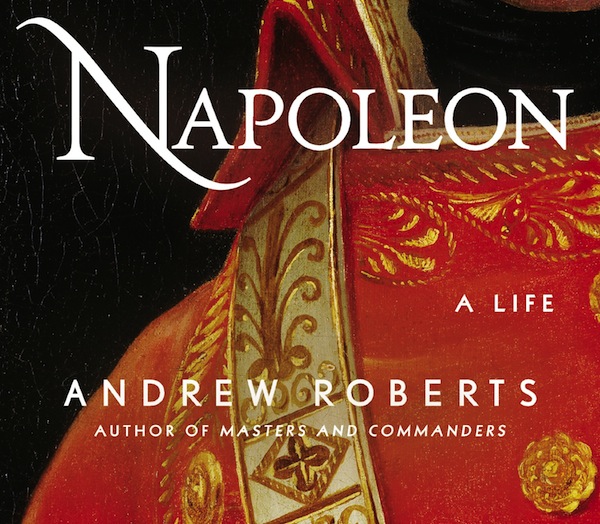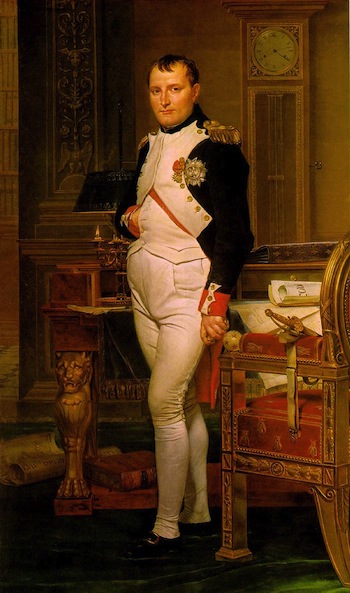Book Review: A Well-Rounded Look at Napoleon the Man and the Myth
Andrew Roberts has succeeded in a single volume in reconciling the two faces of this historical colossus.
Napoleon: A Life, by Andrew Roberts. Viking. 926 pages. $45.00.

By Thomas Filbin
Napoleon Bonaparte was either Hitler or Charlemagne, depending on which side of the English Channel you lived in 1805 after he had won the battle of Austerlitz, perhaps his greatest victory. Having vanquished Austria and sent the Russians scurrying, “Boney” now was able turn his full attentions to Britain which, only by the grace of a strong navy, avoided the fate of most of the rest of Europe.
Whether history will finally judge the French emperor as a necessary force after the turmoil of the French Revolution and The Terror, or just another invading warmonger hell bent on conquest and world domination will depend on the historian. Andrew Roberts, a British author who has spent years researching the records and walking the battlefields of the Napoleonic era, has succeeded in a single volume in reconciling the two faces of this historical colossus. The British generally adhere to the villain theory, even two centuries later, while in France he is still a monumental figure – literally. The Arc de Triomphe, Hotel des Invalides, and the Place Vendome are not merely structures, but daily reminders that France was once the most powerful nation on earth under the solitary and enigmatic man who was not even French by birth.
Roberts takes the story from Napoleon’s humble origins on Corsica to a junior officer’s career in the French army where his brilliance and daring were visible. When revolutionary France was attacked by everyone else eager to clip this republican experiment in the bud, Napoleon saved the day time and time again, rising to the highest levels of command and finally First Consul, the de facto head of state, at the age of thirty. Roberts cites the predictable attitude of the British and how Napoleon managed events to redound to his own benefit: “(when)…the British Foreign Secretary, Lord Grenville, responded by saying that Napoleon should restore the Bourbons, Napoleon replied that if the same principle were applied to Britain, it would result in the restoration of the Stuarts. He made sure that milord Grenville’s letter received wide publicity in France, and it consolidated support behind the Consulate.”
Napoleon’s genius was in assessing an opportunity and seizing it. France’s weariness with the chaos and bloodshed of The Terror created an opening for dictatorship, which most Frenchmen seemed to approve as a necessity.
The case is made for Napoleon’s non-military accomplishments such as the Civil Code, which modernized the legal system (although it was still sexist by current day standards), making peace with the Catholic Church, and establishing the backbone of a strong secondary school system, but as Roberts is essentially a military historian, much of the book is taken up with the nearly eternal state of war that engulfed Europe from 1800-1814. Whole chapters are titled after the great battles or campaigns such as Austerlitz, Jena, Tilsit, Iberia, and Wagram. One’s ears ring with the sound of drums, bugles, and the pounding of cannon; these battles were large scale land engagements, a clash of the titans. Notwithstanding his victories on the continent, naval warfare always favored the British. 1805 and Austerlitz was a military zenith for the French, but they lost the great battle of Trafalgar off the coast of Spain where a rout stamped paid to any chance Napoleon had of bringing the English under his heel. He once claimed that if he had naval supremacy for six hours, he could have invaded Britain, but it never happened. Even as he installed his brothers, sisters, and step children as kings and princes of the newly conquered lands, the island to his west remained free. It is interesting to learn that Napoleon’s control of society was so tight that the French citizenry did not learn of the defeat at Trafalgar until 1814.
Victory often breeds arrogance and overreaching, and when he could have remained still, he was temperamentally unable to do it. This man in motion positioned himself for the final conquest, and mounted what was to be a catastrophic invasion of Russia which began in June, 1814. The vastness of the geography, weather, long supply lines, disease, and exhaustion all decimated the army and only a fraction returned in December.
Napoleon the man is well considered here; he has the reputation of being crude, uneducated, and arrogant beyond all bounds, but the facts give the lie to this. His early years of formation include reading much of the classics. In the military academy he had eight hours a day of Latin, French, German, mathematics, physics, music, and even dance. He read Caesar and Cicero, Virgil and Sallust, and saw plays by Corneille and Racine. He was thoughtful and aware of the sacrifices of the ordinary foot soldiers who worshipped him. Roberts quotes an officer of the Imperial Guard, a Captain Blaze, as saying the Emperor was often known to take off his own cross of the Legion of Honor and pin it to the chest of a brave man. “Louis XIV would have inquired if the brave man was noble. Napoleon asked if the noble was brave.”
As much as he appreciated the sufferings of the infantryman, however, in his Military Maxim No. 38 he said, “The first qualification of a soldier is fortitude under fatigue and privation. Courage is only the second. Hardship, poverty and want are the best school for a soldier.”

Napoleon — Hitler or Charlemagne? Depended on which side of the English Channel you lived in 1805.
Despite his many conquests, both military and romantic, Napoleon could not be called a happy man. Josephine did not love him as much as he did her. His second wife, Marie Louise of Austria, was a political choice. No legitimate son was born to succeed Napoleon; one wonders if he would have slowed down and consolidated to establish a dynasty had it been otherwise.
Napoleon in defeat arouses sympathy; first at Elba, a benign banishment from which he broke free, entered France, and marched to Paris to reclaim his throne. His second defeat at Waterloo imposed a more severe exile: to St. Helena, a volcanic island in the South Atlantic far from any comfort of civilization. He was cordial to his captors, possessing by then a rather stoic and fatalistic attitude. The world, at least as much of it as had been his, was all past tense. Now seagulls, isolation, and increasing ill health were to be his lot.
“Waterloo” has become synonym for disaster as a final chapter of any failed enterprise. Napoleon acknowledged that “…he did not thoroughly understand the battle…”, the loss of which he blamed on “…a combination of extraordinary Fates.” Roberts goes further and says that “Not only did Wellington…deserve to win the battle of Waterloo: Napoleon very much deserved to lose it.”
One cannot help but think that hubris and even a romantic superstition that success must be his went through Napoleon’s mind. After so many victories, so much of Europe under his thumb, then escape from captivity and regaining power, it easy to see from a distance of two hundred years why such a dominating personality assumed that a cosmic justice would give him the winning hand one more time.
The book’s strength is also its liability; the time spent on military matters shortens consideration of the civilization Napoleon spawned, but it reads well and is never a duty. For a different take, a much shorter but perhaps more wide angled view is The Age of Napoleon by longtime chronicler of French history Alistair Horne.
Roberts is not an academic historian, but an immensely curious, dogged investigator who can write capably. The book is a suitable eulogy for a figure so large and mythic. He rose from where he stood, and he fell from where he had risen; his reversal of fortune was as dramatic as any in history.
Thomas Filbin is a lawyer and freelance writer. His reviews have appeared in The New York Times Book Review, The Boston Sunday Globe, and The Hudson Review.
Tagged: Andrew Roberts, biography, European history, history, Napoleon Bonaparte, Napoleon: A Life, non-fiction, Thomas Filbin
